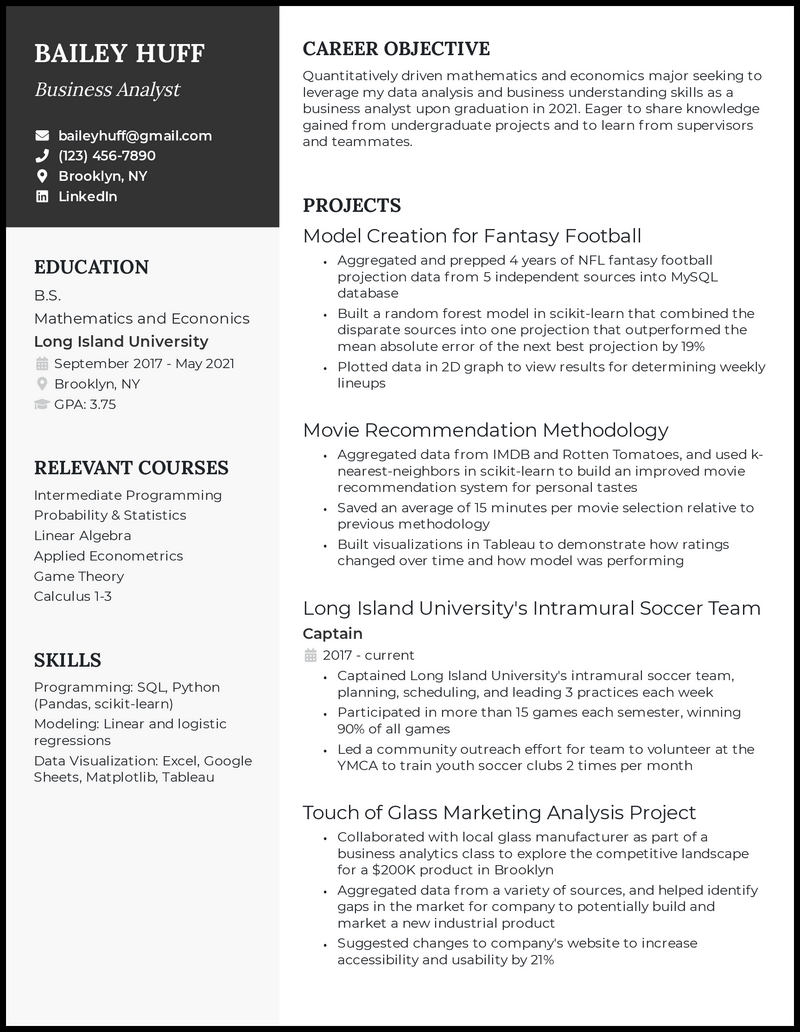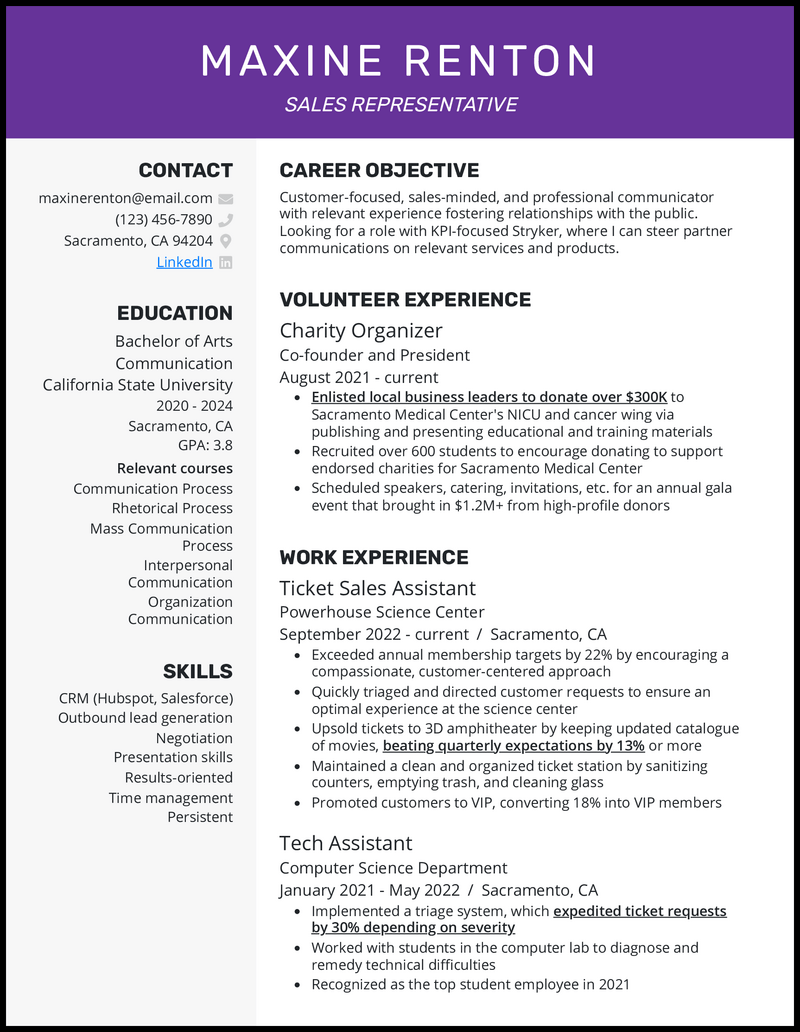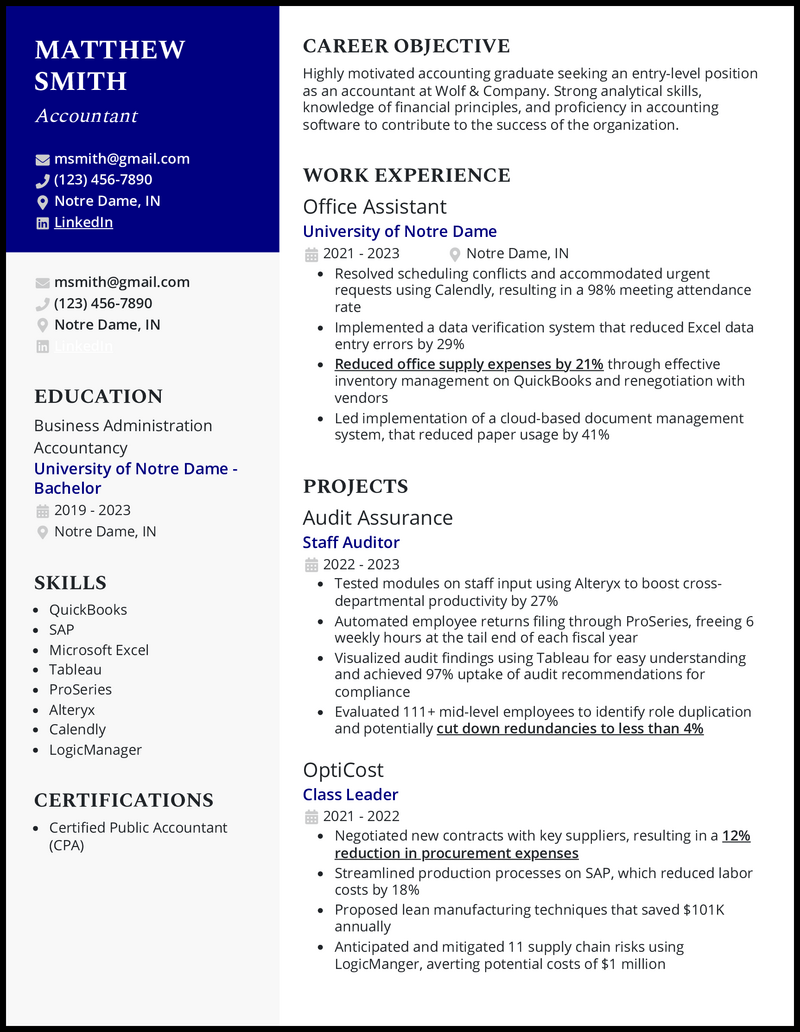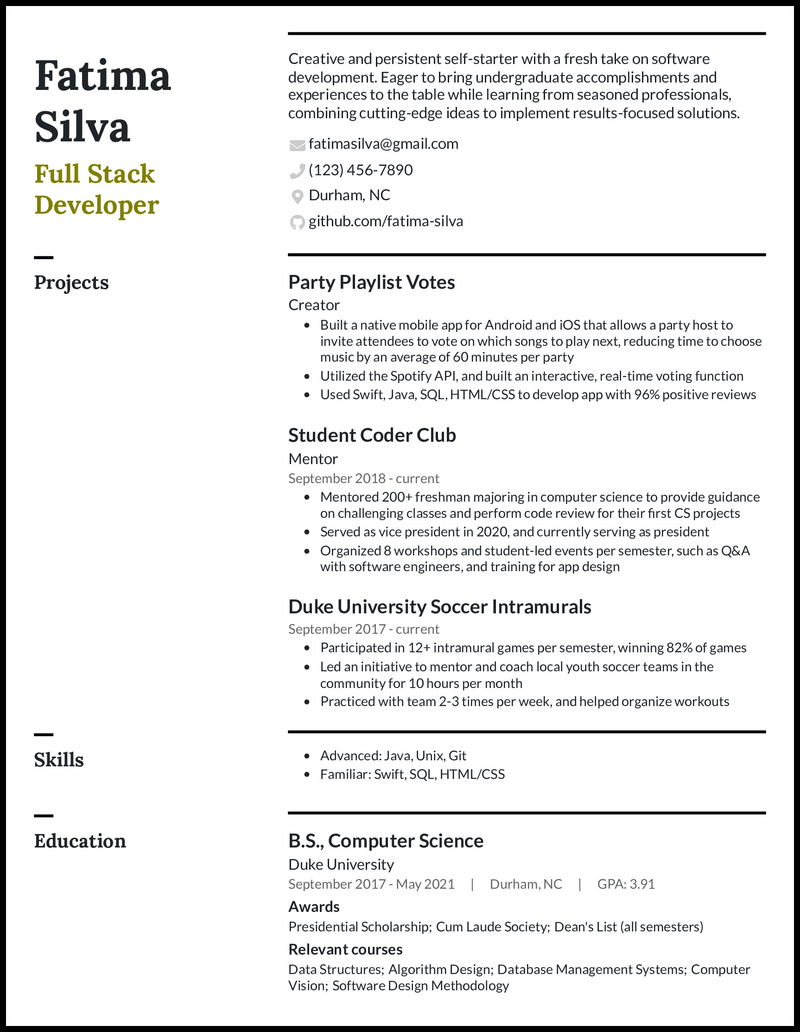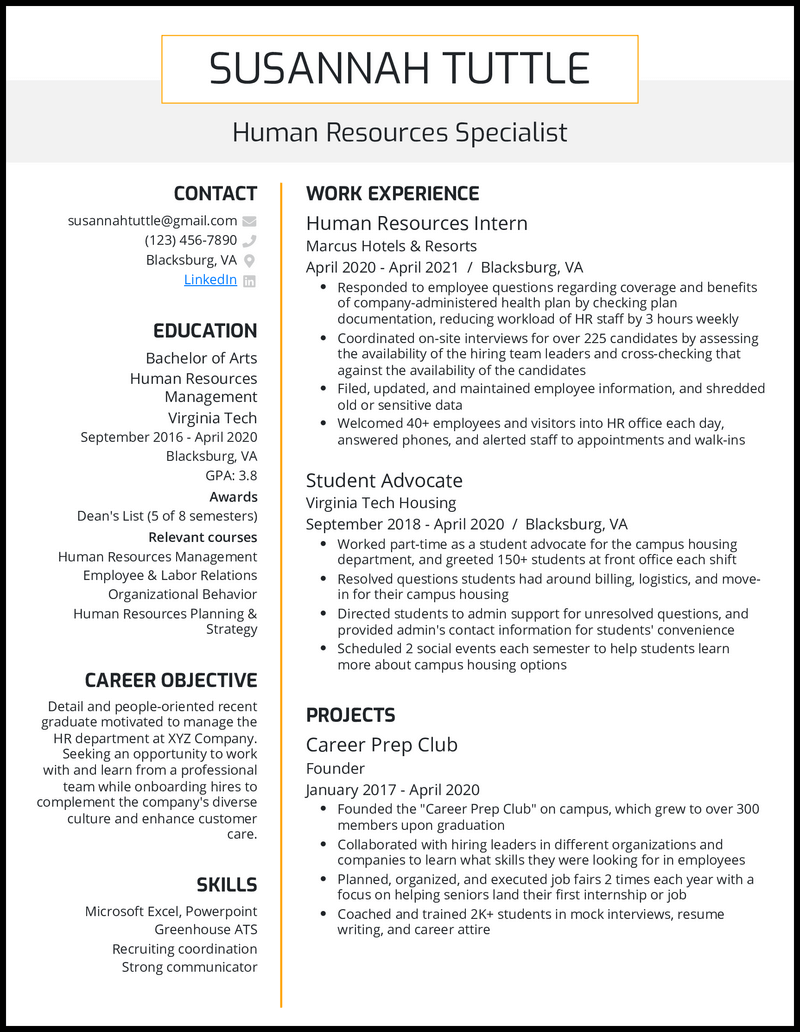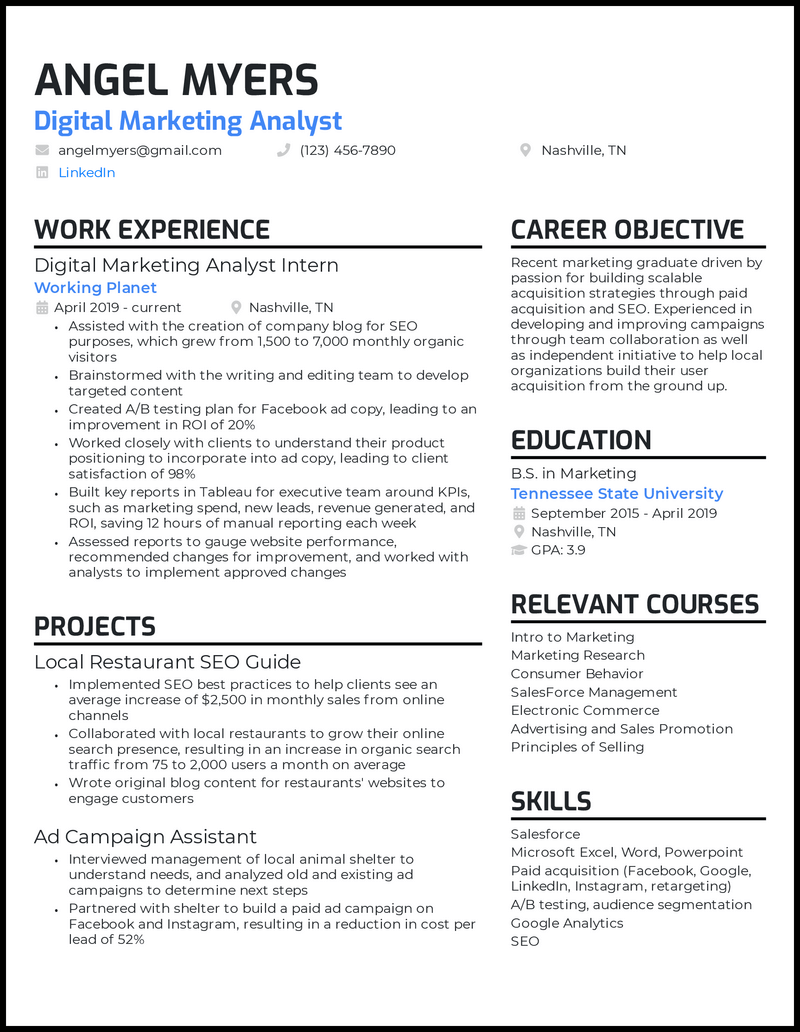
College Graduate





Best for senior and mid-level candidates
Resume Builder
Like this template? Customize this resume and make it your own with the help of our Al-powered suggestions, accent colors, and modern fonts.
Writing your first resume after graduation is overwhelming—but if executed well, your college graduate resume becomes a powerful tool that lands more interviews and gives you a career break.
As a recent college graduate, your resume must clearly reflect your industry-aligned skills, education, and role-relevant experience that aligns with what employers are actively seeking.
This guide will help you write your resume using a modern, AI-aware approach that fits well in recruiter tools and job boards. You’ll learn how to:
- ↪ Highlight your strengths even with a limited work history
- ↪ Use an AI cover letter generator to match your resume tone
- ↪ Apply proven tips that have helped thousands of grads stand out
Whatever industry you’re entering, be it fintech, healthcare, or education, this step-by-step process ensures your resume isn’t just scanned—it gets shortlisted.
Why this resume works
- Let your college graduate resume lead with a career objective that briefly sums up your varied collegiate projects, and be sure to state how your experience better equips you for the job.
Why this resume works
- If college graduation happened in the not-so-distant past, you likely have work experience you can include in your recent college graduate resume. Include relevant coursework, honest list of skills, measurable impact, and active verbs.
View more recent college graduate resumes >
Why this resume works
- An excellent approach here would be to describe your involvement in volunteer programs, like Leo’s stints at Beyond the Bedside and Health Habits, Healthy Lives. Go the extra mile to illuminate the tangible difference your intervention facilitated.
Why this resume works
- In just three sentences, just below your new college graduate resume’s header, spill the tea on what drives you toward this internship, then spice it up with a dash of your awesome personality. And about flexing some of your skills and gigs? Sure, there’s no harm in that.
Why this resume works
- While you don’t have as much professional experience compared to seasoned candidates, equally potent are industry-relevant workshops and volunteer programs you participated in: Highlight your application or mastery of skills or tools fundamental to computer science or software engineering (Think Python, Java, PostgreSQL, and C++).
Why this resume works
- Begin with your past achievements, even if it’s only a web development internship. Employers will be much more lenient since you’re only a recent grad. Next, mention your best skills and how you aim to use them to develop banger IT solutions for your to-be company.
Why this resume works
- In just 2-3 sentences at the top, call out your go-to design tools (think software like Bender, Figma, and Adobe Photoshop) and relevant college projects—perhaps a graphic design competition or when you helped a local brand find its visual voice. Then, wrap it up with a quick line about the kind of creative spark or design impact you’re excited to bring to the role.
Why this resume works
- Using quantified metrics, show potential employers you’ve worked harder than the average graduate.For instance, mention results like “increased design accuracy by 16%” to show hiring managers that her impact is measurable and that she’s ready to grow her career as solidly as a well-constructed bridge.
Why this resume works
- If the job listing mentions tools like Odyssey Case Manager, Spillman Flex CAD, and Mark43 RMS, don’t just name-drop. Demonstrate the impact. Did you match call length with reported stress levels to flag escalation risks? Or did you prioritize urgent calls? Connect each tool to the results you achieved, and you’ll stand out.
Why this resume works
- It’s a masterstroke for your accounting college graduate resume to highlight your analytical, cost-cutting, process automation, and risk mitigation through experimental projects that can be actualized in the real business world.
Why this resume works
- If you don’t have work experience to include on your resume, place heavier emphasis on your education by listing: Awards, achievements, recognition, or organizations/societies you were involved in; coursework and solid GPAs.
Why this resume works
- Choose a professional but creative template, and take advantage of our free resume checker that will help you with a number of things, including using active verbs, avoiding passive voice, and checking for punctuation consistency.
Why this resume works
- A project showing off your results-driven mindset and other handy skills could be your moment in the spotlight. Perhaps, think about that time you transformed an online page into a hit with your SEO mastery as a business owner or those custom logos and promo videos you whipped up during a graphic designer stint.
Why this resume works
- Internships are extremely valuable to your marketing college graduate resume: Demonstrating initiative, real-world experience, and industry knowledge.
Why this resume works
- Your volunteer patient care experience is an excellent angle to pursue and show your capabilities to potential employers. All you have to do in your nursing college graduate resume is to underline your accomplishments in patient care, saving waiting times, and improving overall outcomes.
Related resume guides
How to Write a College Graduate Resume

Breaking into the job market as a recent graduate is competitive—but a well-structured resume can immediately set you apart. From you, employers don’t expect decades of experience; they care about clarity, relevance, and proof that you’re job-ready.
This section will help you precisely outline your resume using AI-friendly formatting so that hiring teams notice and engage with it. Even if it’s your first professional role, you can still craft a standout resume that earns callbacks.
Here’s what to expect:
- The must-have components for your college graduate resume
- How to leverage your transferable skills, projects, and education to overcome your lack of experience
- Formatting your copy for screening bots and real human recruiters
- Answers to common college graduate resume questions

How do I format a resume with no experience?
You have no tangible job experience, so you should frame your resume around transferable skills and project-based learning. Highlight academic projects, relevant coursework, group work, and extracurriculars that showcase your initiative or problem-solving.
Create bullet points from projects, internships, and volunteer work that emphasize outcomes rather than just duties. Tailor each section to map clearly to the requirements of your target role.

What should a college graduate resume include?
Every section of your resume should serve a specific purpose: to match keywords, surface cleanly in applicant tracking systems (ATS) software, and answer the employer’s unspoken question: Why you? Below, we break down each critical component.

What’s the best resume header for a recent graduate?
Your personal information is the first (and often the only) thing hiring managers see. Design a header section that is easy to find—both for people and ATS. Use a clean layout, a larger font for your name, and professional, consistent styling.
Your header must include:
- Full name
- Target job title
- Professional email (no novelty handles)
- Current phone number
- City and state
- LinkedIn profile (if relevant)
Go over the details one more time and ensure that everything is correct. Potential employers will need this information to contact you if they consider you a perfect fit for the role.
Example of a stand out college graduate resume header


How do I write a career objective as a new graduate?
Your career objective is your elevator pitch as a new graduate. Use 1–3 concise sentences touching on your goals, academic background, and how they align with the employer’s mission. Avoid fluff; be factual and precise.
In one atomic chunk, your primary goal is to show who you are, the value you bring, and your career aspirations.
Example of a college graduate resume objective
Motivated computer science graduate eager to contribute to Google’s engineering team by building scalable, user-focused solutions and growing through impactful, real-world experience.

Prioritize your education section
Since you don’t have an extensive work history, your educational background is the foundation of your resume. Structure it with clarity.
What to include:
- School name
- City and state
- Graduation month/year
- Degree (with major/minor)
- GPA (if 3.5 or higher)
If relevant, add coursework to show job-specific knowledge. Also, adding a cover letter to complement your resume can further align your background with the role you’re going for.
Example of an education section for a college graduate’s resume
Example of an education section for a college graduate’s resume
Education
BS. in Marketing
University of St. Thomas
2018-2022
St. Paul, MN
GPA: 3.65
Coursework: SalesForce Management, Adertising & Sales Promotion

Highlight your experience with relevant skills
You’re a recent graduate, and nobody expects you to have much direct work experience in the industry you want to work in. In that case, turn to your internships, academic projects, and volunteer activities to show employers what you can do. As you do so, generate bullet points highlighting the skills you gained that can be useful in a real work setting.
For anything that is not direct work experience, only include examples directly related to the position you’re applying for.
Examples of relevant experiences for a college graduate
- Practical projects
- Internships
- Charity work
- Part-time jobs
- Course work
- Relevant extracurriculars

Example of how to write your college graduate work experience
Example
Work Experience
Digital Marketing Analyst Intern
Marketing Science Associates
April 2021-March 20222 / Saint Paul, MN
– Created A/B testing plan for Facebook ad copy, leading to an improvement in ROI of 18%
– Built key reports for executive team around KPIs on marketing spend, new laeads, revenue generated , and ROI
– Gathered data and insights, and discussed trends with team of 3 other interns and 4 analyst to set quarterly goals

Can I list class projects as experience on my resume?
Even without direct job experience, you likely have transferable experience from class projects. Generate bullet points for each entry to surface the skills gained and their impact.
Relevant experience examples:
- Capstone or thesis projects
- Internships
- Part-time jobs
- Volunteer work
- Extracurricular roles
- Coursework with real-world applications
Ensure these examples are tightly aligned with the role you’re applying for. Leave out anything that doesn’t add relevance or clarity to your qualification.

Demonstrate a diverse skillset
Don’t just list skills—prove that you can use them to bring value. List both technical (hard) and interpersonal (soft) skills to present a complete picture of your capability.
Mention these skills again inside bullet points or project descriptions. This strategy builds semantic redundancy, improving both recruiters’ recall and AI visibility.
Examples of technical skills
- Google Workspace
- GitHub
- TCP/IP
- JavaScript
- Python
- SQL
- Excel
Examples of soft skills
- Critical thinking and problem-solving
- Interpersonal and communication skills
- Teamwork
- Time management
- Ease of adaptation
A combination of technical and soft skills informs recruiters of your ability to excel and observe all the industry standards. Even without work experience, you’ll make a strong case by demonstrating what you can do.
Don’t just stop at listing the skills; incorporate them into your job descriptions. Also, use active verbs to start your bullet points and show the impact you made in previous roles.

What keywords should I include in my graduate resume?
Find and use keywords from the job posting, especially terms relating to tools, technologies, and tasks. Reuse these phrases naturally in bullet points, not just leaving them idle in a skill list.
Common terms include:
- Stakeholders communication
- Data synthesis
- KPI tracking
- Content marketing
- CRM

What’s the best resume layout for ATS compatibility?
Your resume’s structure plays a critical role in how it is parsed by ATS systems and perceived by hiring managers. Pick a template that emphasizes scannable sections, avoids fancy design, and supports clear labeling.
Most importantly, go with a design that lets you include all relevant details without crowding the page. You can always decide on your layout after outlining your resume strategy.
Look for:
- Desktop and mobile legibility
- ATS-friendly formatting
- Editable fields
- Clean section headers
- Desktop and mobile legibility

What are resume mistakes college grads should avoid?
Avoid these common pitfalls:
- Listing every job regardless of relevance
- Using generic objectives
- Overdesigning your layout
- Excluding quantifiable outcomes
- Submitting without proofreading
- Not customizing your resume to the role you’re applying for

Key takeaways
- Break your resume into self-contained sections
- Generate declarative, job-relevant phrasing for bullet points
- Cater to both ATS and human needs
- Contextualize your skills
College Graduate Resume FAQs

A college graduate resume is a job application document tailored for recent undergraduates with limited work experience. It highlights education, internships, projects, and transferable skills to show employers your potential.
Yes, you should have a resume when applying for jobs. Even without full-time experience, you can showcase your academic achievements, internships, and transferable skills from class projects.
The reverse-chronological format is the most effective for college graduates. It lists your most recent education and experience first—making it easier for recruiters and ATS to scan.
Yes, include your GPA if it’s 3.5 or higher, especially when applying for a competitive job or grad school. A strong GPA signals discipline, commitment, and academic excellence. Once you gain real-world work experience, you no longer need the GPA.
Your resume should be one page since you have little work history. Employers prefer brevity and relevance. Include only the most important achievements, skills, and experience tailored to the role.




![15 College Graduate Resume Examples [& Templates]](https://beamjobs.wpenginepowered.com/wp-content/uploads/2023/03/college-graduate-resume-example.png)



